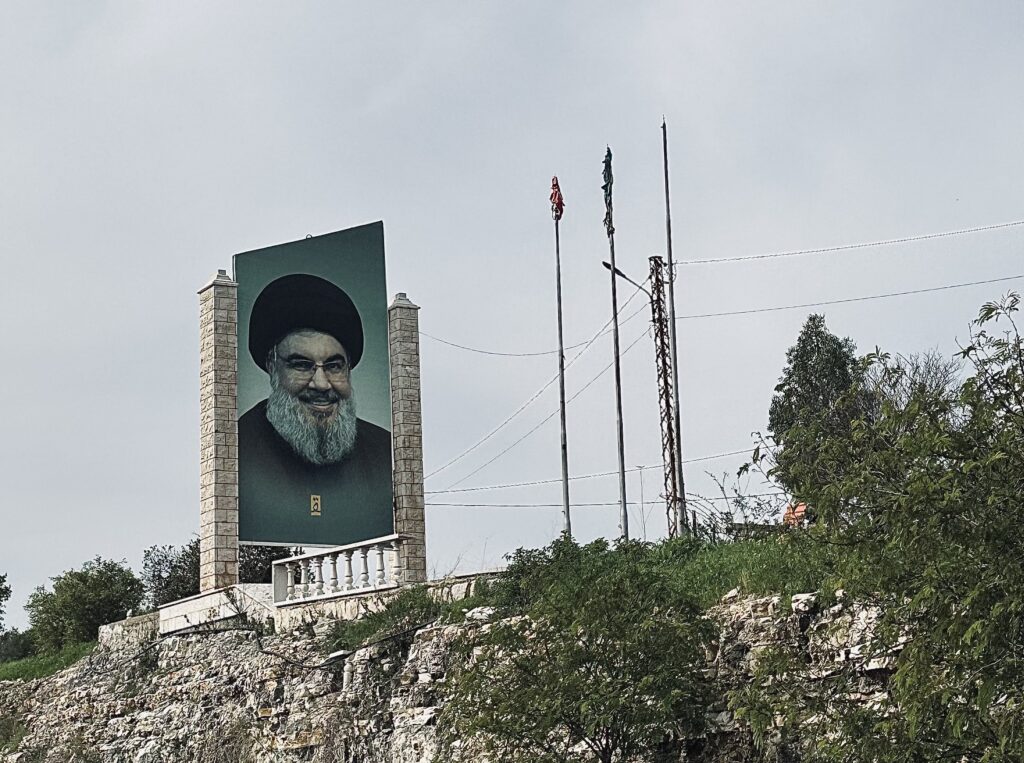Majdal Zoun, Lebanon
At the weekend, Lebanon’s National News Agency reported that Israeli planes had targeted a house in the border village of Khirbet Selm, killing a woman and child — and reportedly wounding nine others in the vicinity of the blast. Images of rescue operators sorting through the rubble circulated widely on social media in the hours following the strike, depicting only the latest incident in a months-long conflagration that has left few villages in the region untouched.
In response to border clashes with Israel, Hezbollah has skillfully employed its expansive media infrastructure — including television channels, radio stations, and social media platforms — to craft and disseminate its resistance narrative. Through these conduits, the group portrays itself as the valiant defender of Lebanon, framing its actions as a righteous resistance against Israeli aggression. This narrative is amplified by campaigns designed to galvanise support among the broader Lebanese populace by highlighting its role in safeguarding the nation and supporting the welfare of its communities amid ongoing conflicts.
At the core of these media operations is Al-Manar TV, a Beirut-based satellite television station that commenced broadcasting in the early Nineties. Al-Manar, alongside a suite of its associated properties, forms the backbone of Hezbollah’s media empire, disseminating content that ranges from news and political commentary to cultural and religious programming.
Hezbollah’s media strategy is multifaceted but emphasises personal narrative in order to humanise its fighters, glorify its military endeavours, and vilify its adversaries — both Israeli and Western. Through vivid imagery and emotive language, its broadcasts and publications aim to cultivate a strong collective identity among its Shiite base, while appealing to a broader Arab and Muslim audiences by framing its cause within the context of regional politics and the struggle against perceived Western imperialism and Israeli expansionism.
One especially conspicuous priority of Hezbollah-aligned media is the lionisation of so-called martyrs — fighters and civilians alike who have been killed by Israel. Al-Manar, for example, publishes brief eulogies in a standard format whenever Hezbollah fighters are killed.
المقاومة الإسلامية تزف الشهيد المجاهد حسن جعفر مرجي "باقر" مواليد عام 1996 من بلدة بليدا في جنوب لبنان الذي ارتقى شهيداً على طريق القدس pic.twitter.com/rmYZQjiJIp
— قناة المنار (@TVManar1) March 10, 2024
Across the digital realm, Hezbollah has adeptly embraced social media, leveraging platforms such as Twitter, Facebook, and YouTube to circumvent the limitations of traditional media channels. Despite facing bans and content restrictions from American companies, the group has continued to innovate in its digital outreach, employing proxies and supporters to disseminate its message, thus ensuring its narratives persist online. Al-Manar’s Twitter profile currently has over 115k followers, consistently engaging with some of Lebanon’s most prominent accounts.

 Main Edition
Main Edition US
US FR
FR








Join the discussion
Join like minded readers that support our journalism by becoming a paid subscriber
To join the discussion in the comments, become a paid subscriber.
Join like minded readers that support our journalism, read unlimited articles and enjoy other subscriber-only benefits.
SubscribeWhat would be more helpful, IMHO, is an article investigating and explaining whether what Hezbollah broadcasts is true or false.
All good communicators try to characterize the facts in the light most favorable to their goals. But the key thing to know is whether the facts they are characterizing are true or false. Were women and children killed? Were the other people killed terrorists? Were the terrorists deliberately hiding among the women and children? Did the women and children welcome the terrorists into their home?
Everyone has opinions and assumptions already about the answers to these questions. The role of good journalism is to provide specificity to rebut or confirm our pre-existing narratives.
False in my opinion. I can smell it a mile off whatever they dress it up in.
Is anyone else any different ?
There are some who stick to the truth. You have to sort them out in your mind.
Got to feed the proles they’re Prolefeed! They love to lap it up, they believe the lies because they want to believe them.